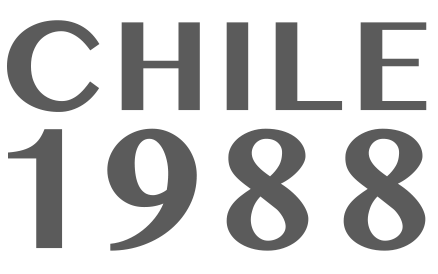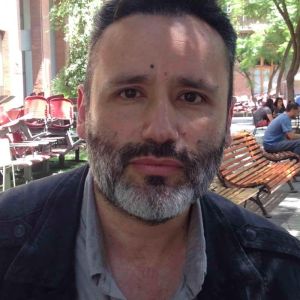Let me see, I have vivid memories regarding those years because I lived in a rural area with very little information. My parents are from the countryside, so they didn’t have contacts with big cities, and in fact, the nearest major city was not the capital of Provincia, far from it, it was a small city. Rural life meant dirt roads, studying in a basic school with a number, which was what the dictatorship institutionalized during those years, leave small schools, tightly connected to the centers but with a minimal and necessary education. It meant an education that wasn’t humanistic but rather very technical, anchored in agricultural work, which was the ceiling you had living there. It was assumed that none of us would leave the countryside, that we wouldn’t go to cities, but rather that we would work in agricultural labor, and for that, we had to be ready by the age of 13 or 14. So, at that time, I was around thirteen or fourteen years old. My father, especially, had some connection to politics because he was working in a shipyard in the port on the day of the coup – I was born in Valparaíso because of that – he was on a ship there. He was imprisoned there for a couple of days. Luckily, he survived. It wasn’t due to anything else. But many of his colleagues never returned.
My parents went to vote that day with a lot of fear. And I remember that perfectly because everyone who went to vote was very afraid. There was a lot of speculation and many myths among the neighbors, especially about what they could vote for and whether there were votes being asked for at the polling stations. “Hey, you have to vote for ‘yes,’ you have to vote for ‘yes.’ We’re watching you, we’re watching you.” So my parents didn’t see any of that, but the neighbors did, and everyone knows each other there. That’s one of the advantages of living in the countryside, that everyone knows each other, everyone is someone’s child or studied with someone else, there are many connections there. There was a lot of fear going around. So I can confirm and remember perfectly when my father came back from voting, and he voted for ‘no.’ My mother also voted for ‘no.’ They didn’t go together to vote because it wasn’t well seen to form groups. So I remember my father went around mid-morning, my mother went early in the morning, one came back, and the other one left. After that, we were told that many people were very fearful and that some people we knew had voted ‘yes’ precisely because of that fear. There was also a lot of ignorance because some thought that someone was watching the votes. Not that there were cameras because at that time we didn’t have cell phones or the proximity to cameras, but there were a lot of rumors, people who might have been snitchs, saying, “Hey, the people from here formed this group, they gathered earlier in such a place, in such a sports club.”
Near my home, there was also a local headquarters of Sema Chile, where a good number of elderly people from the countryside were recruited. It was mostly women, and there was indoctrination based on this as well. It was obviously a cell of the dictatorship placed there, and it didn’t require much effort either because ignorance and fear prevailed. So, that perspective couldn’t be worked on much either. Yeah, there was a group of young people, small and I would say minority, who campaigned. I remember they would put NO posters or pamphlets on the doors of the Sema Chile elderly women, at the entrance of Chacarita, or the houses where they lived, which were old adobe houses, very sturdy material. They would stick the “no” posters as a provocative gesture, but it was the most they could do at that time. There were many police officers and soldiers on the streets. So, it had the double function of protecting the process on one hand but also instilling fear and distance: “Watch out, we’re here, don’t even think about doing something foolish.” We, being younger, also had a very fragmented view of this because my parents never wanted us to get involved in political matters without having all the information. They didn’t tell us everything.
For example, I only found out later that my father was imprisoned on La Esmeralda when he was older. So, from that perspective, I believe their efforts to safeguard our political opinions until we had the appropriate tools to judge and express our own opinions were the right approach. They didn’t politicize us prematurely because we grew up in a complex enough time to understand and gradually communicate. We didn’t have proper television, so everything was filtered, heavily influenced by the official television channel, Channel 7. I remember my father getting informed through the Cooperative Radio, which was the radio station that could provide some certainty regarding the information at that time. Besides that, everything else was aligned with the official narrative. So, I have memories of Sergio Campos, for example, giving updates, hinting in the late afternoon that there could be a possibility of a victory for the “No” side. I would say that during those afternoon hours, the process was much slower than it is now, much more automatic. It was still an illusion because shortly after that, an official report from the Ministry of the Interior announced that the “yes” side was leading, and for all of us, it was very difficult to understand that they could actually win and that if they did, the Junta would acknowledge it. Two things had to happen, not just one. Two, because it required both acknowledgment and then a public concession from a member of the Junta, live and in front of all of Chile.
So, the role of radio seems essential to me. In my house, we listened to the radio more than watching TV news. The real news was on the radio because of what happened afterwards. Well, it’s highly debatable whether we experienced an adequate transition or not. I think that’s a conversation that can take place over time, and we can still continue discussing it for two or three more governments. But I still have a statement from my father that has remained throughout time. He’s almost 70 years old, and he says that in all his experiences, work, and everything he has gone through here in Chile, he had never seen people happier on the streets than in that moment. That’s why I say it’s debatable, but even in that very moment, right after the plebiscite, after there was a forced acknowledgment and all the struggles regarding the dictatorship, when it was confirmed that the “no” side had indeed won, he had never seen people so joyful on the streets. It had to do with a whole world that changed. It was a very dark period in Chile, and at least my generation will continue to live through it.
My children won’t. The generational issue will affect us, the people who are 40 years old and older. I hope that the younger generation, those who are 20 and above, can build a different country, that the transition can end mentally, not just in terms of events. No, no, no, here we’re talking from the perspective of political parties, political movements. But that moment I mentioned with my father, he still remembers it today, even though he’s over seventy years old. He says, “I wouldn’t change anything that happened for that moment when the triumph of ‘no’ was revealed, and people had that spontaneous street carnival. Yes, without restraints and without fear, it was a true liberation for the majority, for this country.”


